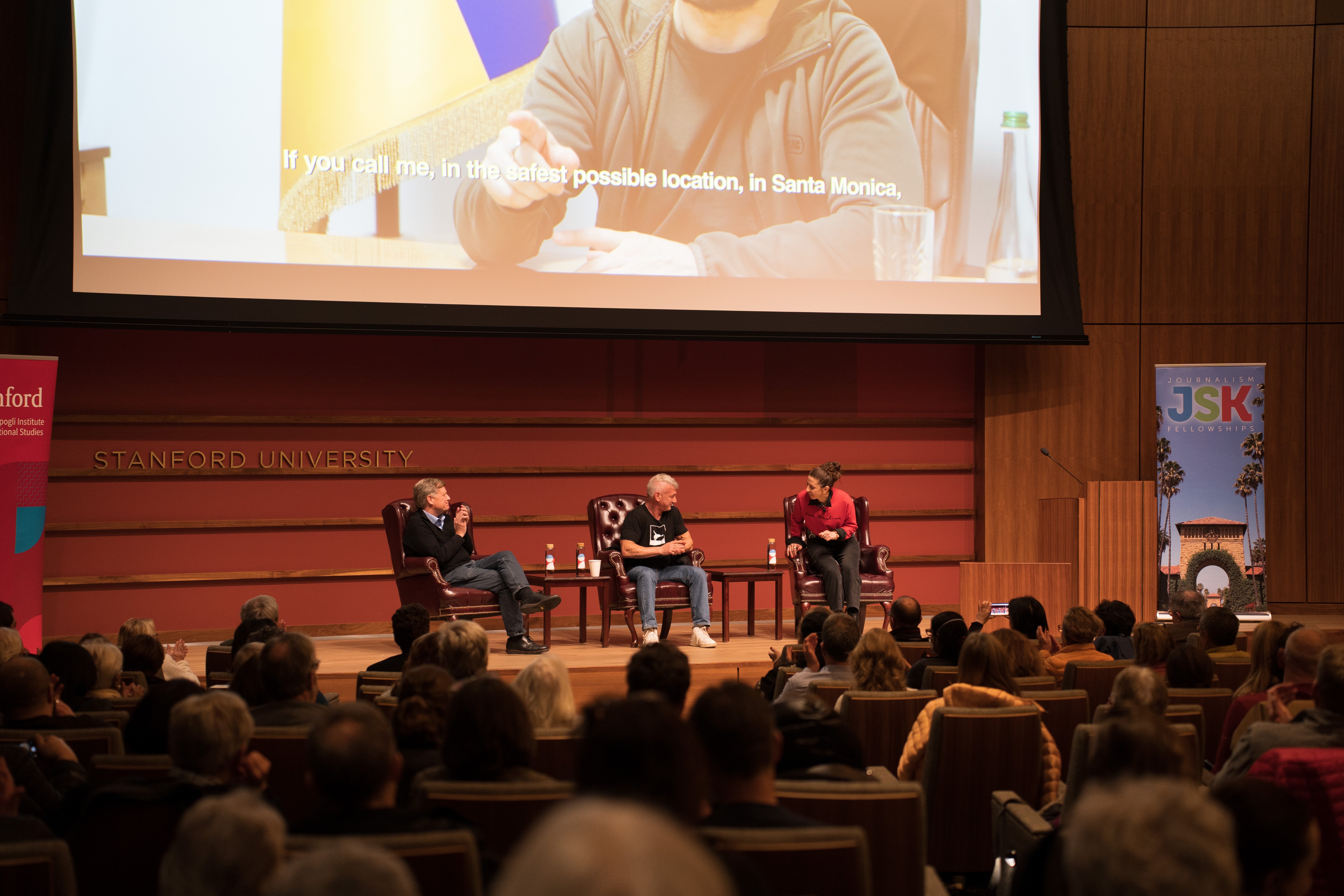“Superpower,” a feature film documenting Oscar-winner Sean Penn’s experience in Ukraine amid Russia’s Feb. 2022 invasion, was screened Thursday evening at the Hoover Institution.
Hundreds of audience members, including notable alumni, filled the Hauck Auditorium, among them former U.S. ambassador to Ukraine Steven Pifer ’76. After the screening, Penn joined fellow former ambassador and Freeman Spogli Institute Director Michael McFaul ’86 M.A. ’86 in a follow-up Q&A moderated by Natalia Antelava, editor in chief of Coda Story and a John S. Knight journalism fellow.
“Superpower” follows Penn during his seven visits to Ukraine over the course of 18 months, when he unexpectedly found himself in the midst of Russia’s full-scale invasion of Ukraine.
Co-directed by Aaron Kaufman and produced by Vice, the documentary was initially intended to be a feature film on Volodmyr Zelenskyy, once a Ukrainian comedian and now its president. Scattered news clips and interviews with Zelenskyy in his presidential bunker punctuate the film.
The end result, “Superpower,” filmed Penn and his production team as they navigated an invasion-besieged Kyiv.
The audience reacted to the film’s on-the-ground footage at times with laughter and at times with silence. When Penn narrated his journey to the Poland border days after the invasion started, the audience grew especially solemn and attentive.
The meaning of the film’s title “Superpower” became clear in the film’s final scene of Zelenskyy.
“Do you have a superpower?” asks Zelenskyy’s young son, while lying next to his father in their home.
“You,” Zelenskyy responded. “You are my superpower.”
According to the film, Ukraine’s superpower lies in the strength of its leader, its people and a mentality captured in a concluding quote: “In the time of your life, live.”
At the Q&A following the screening, McFaul emphasized the sizable representation of previous Stanford fellows in Penn’s film, joking that Penn “found all the smartest people in Ukraine.”
Penn, a self-described “obligated optimist,” said that he entered the documentary with a largely “blank slate” of historical knowledge. There were moments in the film where he stood back to “listen to the smart people,” he told the audience, before pointing out Pifer and thanking McFaul for his years of scholarship on Ukraine’s Orange Revolution.
A member of the audience, whom Penn recognized as a former high school classmate, asked why Penn decided to halt filming the ongoing war and release the documentary last February. In response, Penn replied that he wanted to release the film before the 2024 U.S. presidential election. He emphasized that sending weapons to Ukraine is of utmost importance.
“This is where weapons are humanitarian,” Penn said.
Directly addressing the audience, McFaul pushed back on the idea that Ukraine is losing the war in the Q&A.
“I think the defense of the territory is victory,” McFaul said. “It feels like [Ukraine] is doing much better than anybody two years ago predicted.”
McFaul, who met with officials in Lithuania last week, emphasized the importance of both U.S. and foreign aid for Ukraine. “As all Ukrainians in this film said, it’s not like they have a choice to fight or not. We have a choice to pass the assistance bill in Congress,” McFaul said, referring to the funding legislation for military aid to Ukraine currently stalled in Congress.
Penn appeared teary when asked if there was a story not featured in the film that he wanted to share.
“It’s not so much the things that we shot that I didn’t include that moved me,” he said, after a long pause. “It’s the things that came of the relationships I built.”
At 63 years old, Penn said this documentary is his “last stand moment.” The chance to be in Ukraine and film this documentary was “a gift of an accident in my life,” he said.
“‘Superpower’ captures very clearly something that’s deeply internalized by everyone who has ever been on the receiving side of Russian aggression,” wrote Antelava, who experienced Russian military intervention in her native country Georgia, in an email to The Daily. “Here in California, we are very far from Russia — and yet, all of us are part of this civilizational war.”
